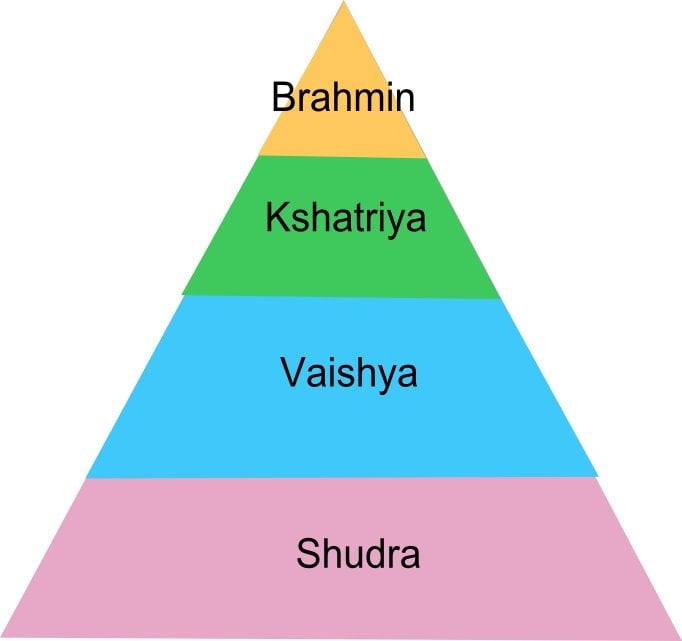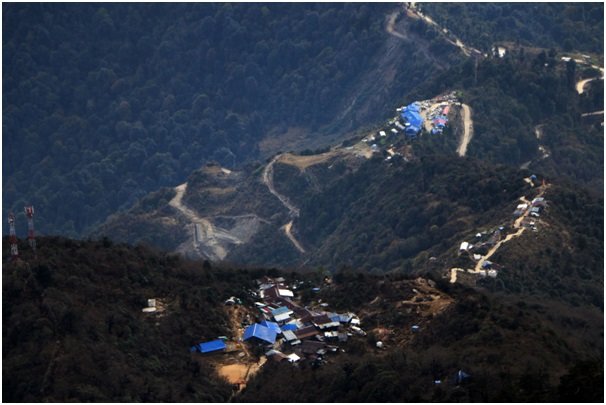Effects of Caste

Two parallel theatrical performances are ongoing in Nepal – in Baneshwor, a performance of party politics and in Battisputali, that of social politics. The theatrics of party politics involves installing two big men as the president and the vice president of the country. The Dalits, and among them, the Dalit women, and among them, Madheshi Dalit women, are groups that have been the most oppressed by the state, and who have received the fewest opportunities for representation in the state. But as a part of this theatrical performance, the political parties liberated themselves from their duty to appoint a woman, or a Dalit person, or a Dalit woman, the president, or vice-president. They appealed to lifeless technicality instead of serving the living essence of the constitution or the People’s Movement to deny these groups that opportunity at meaningful representation.
Yet, Nepali history has already seen how a woman president could attack women’s representation by working continuously to limit women to the status of non-citizens. This is precisely why the principles and practices of representation require that representation not be merely superficial, but be firmly rooted in issues. This applies not only to the state mechanism and the practice of political parties, not only to social organizations and institutions but also to cultural production and artistic output. As I watched Vimoksha: The Salvation, a play being staged at Shilpi Theater in Battisputali, questions about representation and its authenticity continuously played on my mind.
Representation requires presence and must engage with the issues raised by those being represented. But where do we see that in our society?
The playwright and actor Ghimire Yubaraj’s creation Vimoksha, which has gained additional lustre from the directorial capabilities of Prabin Khatiwada, reveals the corrosive effects of social constructs like caste and gender, which have a firm hold over Nepali society. It made me wonder if simple love is at all possible across the vast societal gulf shaped by the state, power, and property, or in a world separated by the unassailable wall of caste and gender. If, in this society, a Deep Darnal, who is barely considered human because of his caste, cannot find a home to rent without putting on a false mask as Kamal Ghimire, how can inter-caste, interclass, and intergenerational love become possible? In this society, the inter-caste love of Ajit Mijar and Nabaraj BK is forbidden. Is it surprising then that a Darnal, who is forced to lie about his caste and pass off as a Ghimire, is cursed to remain the toy of a powerful wife of a colonel?
The human relationships of love and sex portrayed in Vimoksha are not apolitical issues. Just as the reality of representation in the state and its institutions, as revealed by the presidential elections and other theatrics, are not merely political issues. Should we, or should we not, see these issues from the eyes and minds of the people who have been kept at the very bottom of the socio-political hierarchy? Should we not interpret these political developments and artistic outputs from the perspectives of their struggles and resistances? This is the ultimate political question that must be repeatedly raised from the span between culture and politics, and one which cannot be allowed to go unanswered.
Be it in a theatrical play, or in political parties which foster dreams of Dalit liberation, why do Dalits never find proper representation? Why is their presence never substantial and vital, and why are Dalit issues never sincerely engaged with? Why has there been no proper representation of Dalit agency, established through so much resistance against problems and issues arising from the caste system? This question is as pertinent to the struggles of a fictitious Deep Darnal as it is to the many Dalits active on the social stage.
Dalit shoulders burdened by caste-system
In Vimoksha, Deep Darnal, the protagonist, is a researcher and the director of the Chautari Research Center. Many Dalit individuals just like him are active in the social sphere, carrying out research, study, and advocacy aimed at Dalit liberation. Some Dalit leaders have shown the way forward by establishing such research institutions, while other Dalit youths have been appointed directors and chairpersons of already well-established institutions. More and more non-government organizations (NGOs) are addressing the caste system and Dalit issues. Among these, Samata Foundation and Dignity Initiative have been studying Dalit representation, Dalit human rights, inclusivity, governance, gender justice, and to some extent, the overall condition of Dalit communities. But many organizations – like so many other NGOs – have been distributing biscuits and noodles, or helping Dalits rear goats and sheep. Compared to them, organizations and leaders who interrogate and study the caste system and advocate on behalf of the Dalit community shoulder a greater burden of duty and responsibility. But the irony is that their shoulders – just like those of the Nepali state and the political parties – are burdened with their strictures of caste, gender, and nepotism.
Even as organizations that present themselves as ‘think tanks’ raise legitimate political demands for Dalit representation in the state and political parties, their leadership must ask to democratize and restructure their organizations. Otherwise, they will not shake off the burdens of caste, gender, and nepotism. As they ask rightful questions about inclusion in the police, administration, judicial system, educational institutions, and the media, is it not necessary to reorganize and expand their organizations to reflect the caste and ethnic diversity existing in society? Or will they continue to run their organizations just like how the unitary and centralized state ruled over Nepal? If an organization is shaped by the hegemony of a particular caste, and in doing so prohibits capable and expert individuals from other castes, how does it retain the moral qualifications to oppose the single-caste hegemony in the state and the political parties?
Does an organization perpetuating the culture of oppression and discrimination, along with caste-based socio-political structures and power relations, continue to have a legitimate voice with which to condemn external and internal caste-based discrimination? Is it not political hypocrisy to demand Dalit representation, inclusivity, proportional participation and restructuring while also imposing the hegemony of a single caste group? If we seek to liberate all oppressed groups, including Dalits, and end the caste system, we must ask this with critical reflexivity – When it comes to exclusion, oppression, and discrimination, what distinguishes us from the attitudes of the ruling class, caste, and gender, and majoritarian ideologies and cultures?
Nepotism and the privatization of organizations
Most Dalit NGOs face the allegation that nepotism is rampant in their organizations. How will Dalit activists who champion justice, equity, and dignity counter these allegations through their ideas and action? Recruiting brothers and cousins, nephews and nieces, sisters, daughters-in-law, and their fathers into one’s organization makes the privatization of the organization strong. But how does that promote internal democracy? Can an organization that has increased its resources and organizational powers through privatization and nepotism be considered to have embraced and expanded the values of inclusion and proportional participation?
Political leaders of the Dalit movement in Nepal and other civil society activists have always remained silent about another problem – the abuse of power, resources, material, and wealth which is inextricable from the privatization and family capture of an organization. Certainly, recruiting relatives into the organization helps to distribute resources within the family circle. But it also helps in obscuring the details of the abuse of these resources. Privatization of organizations indicates bad governance. The moment the state or an organization is regarded as one’s fiefdom, good governance disappears: corruption flourishes under a monopoly. Soon, a new norm arises: the heads of organizations become owners of new homes and cars while their organizations remain barely functional. Should we not confront, address, and heal the chronic illness in which an institution, organization, or movement fails to become sustainable, self-regulated, autonomous, and institutionalized?
Gender justice neglected
The Dalit NGO community has also been ignoring the question of gender justice. Nobody fails to advocate for gender justice while speaking in public, making demands from the government, or submitting reports to donor agencies. Regrettably, those very utterances, demands, and reports are used to bury the voice of gender justice. In most organizations under male leadership, the culture of respecting and accepting women’s opinions, questions, ideas, leadership, and participation is barely present. Projects led by Dalit women are denied cooperation. There is also a culture of actively creating obstacles and obstructions for them. When it comes to Madheshi Dalit women, Dalit sexual minorities, and queer Dalits, there is palpable toxicity of the sort that rejects the very existence of these groups. To tokenize their sexuality and gender merely to deceive the donors is a deeply cynical mindset that fosters a politics of un-representation. Can such a politics of toxic masculinity ever help us establish gender justice in our institutions, organizations, political parties, movements, and the state?
Perhaps your think-tank is empty?
Leadership at any institution, organization, political party, movement, or state ought to be chosen based on strong ideas and imagination, and the capacity to lead the organization. But often positions in organizations are captured and occupied permanently without having to show any far-reaching ideas, imagination, or aspirations, or without an affinity for or dedication toward an institution’s mission, intention, and policies. If an individual who has never studied or researched, never published an academic paper, who lacks a deep knowledge of relevant issues, who even lack the urge to acquire new knowledge, occupies the highest office at a think-tank involved in interrogating the caste system, how will that organization and the issues it champions ever progress? How will new knowledge ever be produced? How will scholars and researchers become inspired to dedicate themselves to knowledge production?
When a Dalit-led think-tank studying the caste system uses terms like ‘the so-called Dalits’ in its scholarship, research and advocacy, how do such publications retain any credibility or validity? How will the organization collect assistance for scholarship, research, and advocacy in newer areas? How does distributing packaged noodles, going off on frequent visits abroad, holding a few luncheon workshops, making a few sweetly-worded speeches, or gathering crowds in every district to have photos taken with mayors, chief district officers, chief ministers, or the prime minister, lead to the production of acute knowledge? If these avenues really led to new knowledge, why would anyone dedicate themselves to intense scholarship and research? Those who run ‘think-tanks’ that produce no new knowledge should examine their work against these questions.
No doubt, a purposeful job at an institution also provides a livelihood. But livelihood without an affinity for or dedication toward the institutional mission, intention, and policies leads to institutional collapse. A tendency to use an organization to acquire positions, wealth, honours, and influence leads to a loss of the organization’s standing. An individual who has one foot in the director or chairperson’s office but has the other foot wandering about in search of political appointments as an ambassador or a member of parliament may gain wider personal recognition, but that attitude enfeebles the sustainability of the organization. If a founding member of Samata Foundation, Dr. Sumitra Manandhar Gurung, and board member and writer, Sarita Pariyar, are forced to publicly raise their concerns regarding nepotism and favouritism, gender and internal caste-based discrimination, governance and the use or abuse of resources within Samata, it will face difficulty in holding on to its reputation and existence. Going forward, it is necessary for all responsible Dalit leaders, activists, scholars, and researchers to undergo rigorous self-reflection and exchange of ideas.
Translated by Prawin Adhikari.






Leave Comment